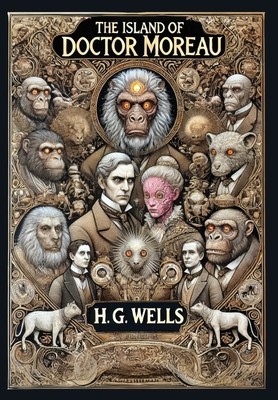
- We will send in 10–14 business days.
- Author: H G Wells
- Publisher: Revive Classics
- ISBN-10: 1998667413
- ISBN-13: 9781998667413
- Format: 15.2 x 22.9 x 1.1 cm, kieti viršeliai
- Language: English
- SAVE -10% with code: EXTRA
The Island of Doctor Moreau (Collector's Edition) (Laminated Hardback with Jacket) (e-book) (used book) | bookbook.eu
Reviews
Description
Collector's Edition Laminated Hardback with JacketAn Englishman, survives a shipwreck and is rescued by a passing vessel. He is brought to a secluded island governed by Dr. Moreau, a scientist notorious for his controversial experiments in vivisection. Prendick discovers that Moreau is conducting gruesome procedures to transform animals into human-like creatures, known as the Beast Folk. As Prendick navigates the island's dangers, he grapples with profound questions about the nature of humanity and the ethical boundaries of scientific exploration.
Published in 1896, H.G. Wells's The Island of Doctor Moreau is a seminal work in early science fiction, exploring themes of pain, cruelty, moral responsibility, human identity, and the consequences of human interference with nature. The novel introduces the concept of "uplift," where a more advanced race intervenes in the evolution of an animal species to elevate its intelligence. Wells described the book as "an exercise in youthful blasphemy," reflecting its provocative nature. The story has been adapted into various films and media, underscoring its enduring influence on discussions about the ethical limits of scientific experimentation and the essence of humanity.
EXTRA 10 % discount with code: EXTRA
The promotion ends in 24d.03:04:20
The discount code is valid when purchasing from 10 €. Discounts do not stack.
- Author: H G Wells
- Publisher: Revive Classics
- ISBN-10: 1998667413
- ISBN-13: 9781998667413
- Format: 15.2 x 22.9 x 1.1 cm, kieti viršeliai
- Language: English English
An Englishman, survives a shipwreck and is rescued by a passing vessel. He is brought to a secluded island governed by Dr. Moreau, a scientist notorious for his controversial experiments in vivisection. Prendick discovers that Moreau is conducting gruesome procedures to transform animals into human-like creatures, known as the Beast Folk. As Prendick navigates the island's dangers, he grapples with profound questions about the nature of humanity and the ethical boundaries of scientific exploration.
Published in 1896, H.G. Wells's The Island of Doctor Moreau is a seminal work in early science fiction, exploring themes of pain, cruelty, moral responsibility, human identity, and the consequences of human interference with nature. The novel introduces the concept of "uplift," where a more advanced race intervenes in the evolution of an animal species to elevate its intelligence. Wells described the book as "an exercise in youthful blasphemy," reflecting its provocative nature. The story has been adapted into various films and media, underscoring its enduring influence on discussions about the ethical limits of scientific experimentation and the essence of humanity.


Reviews